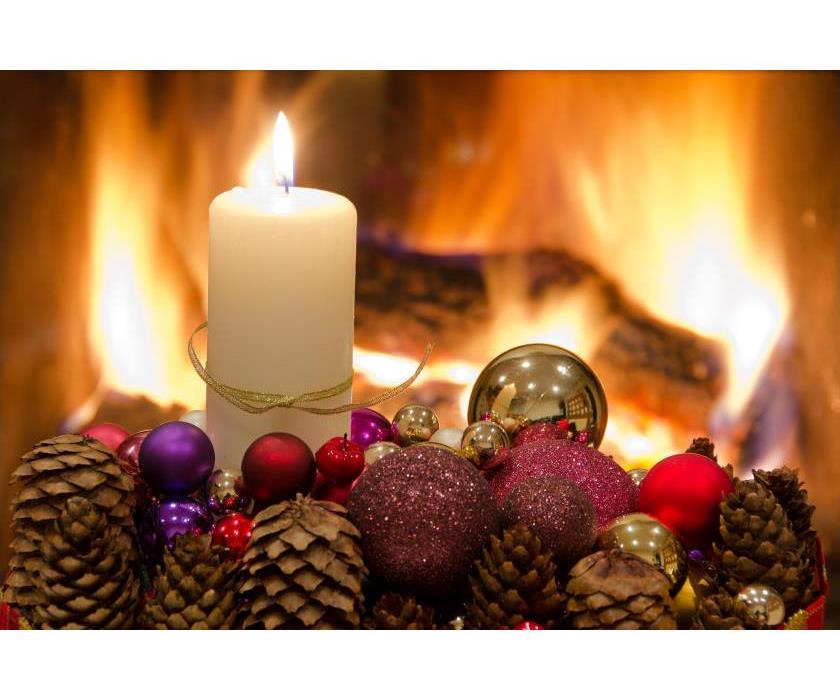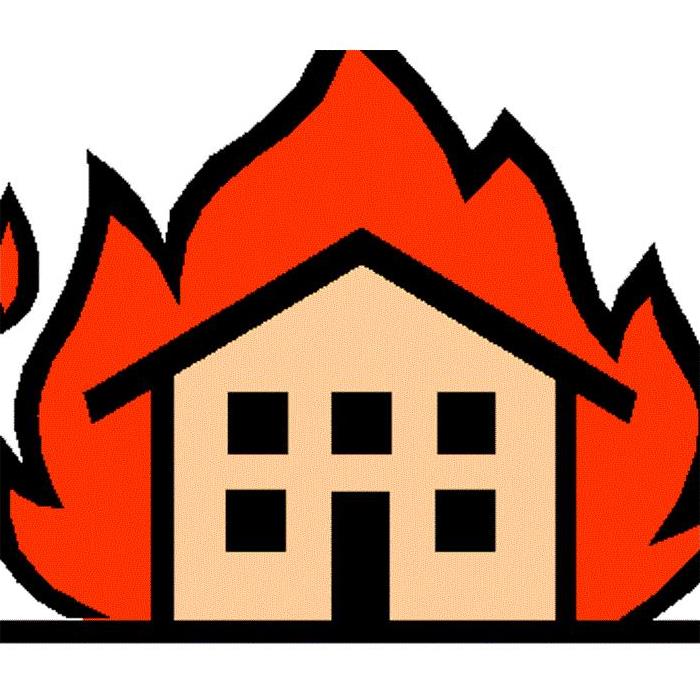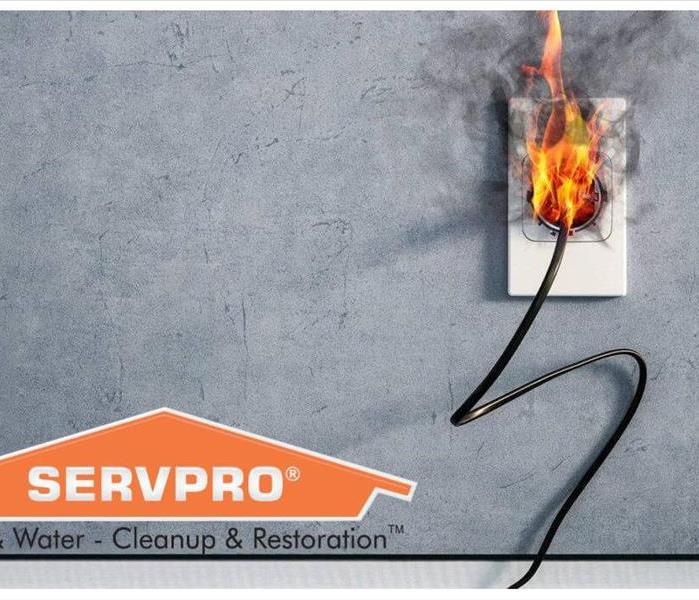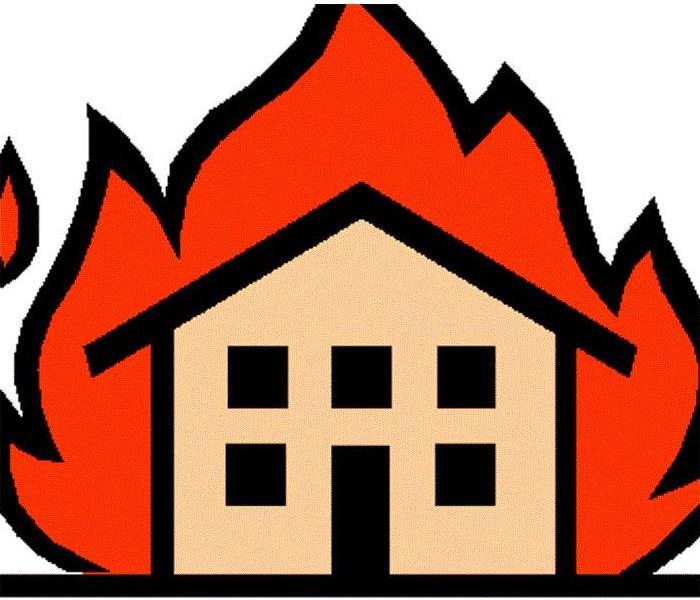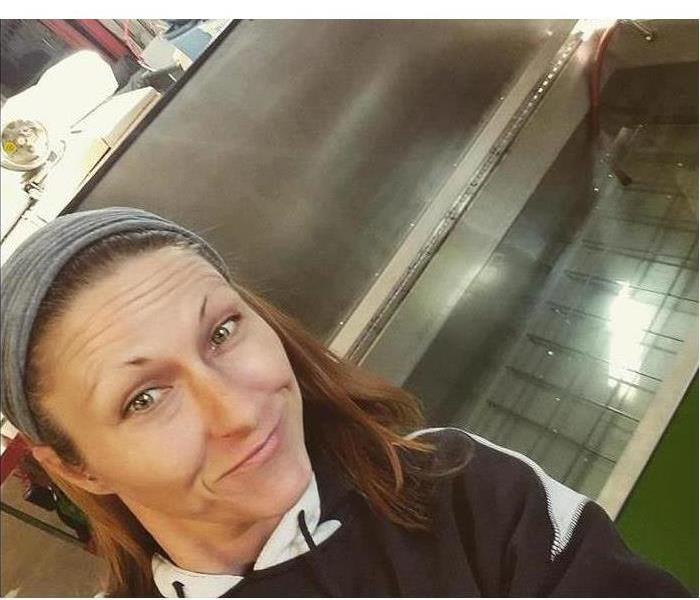Recent Fire Damage Posts
Be careful with candles: Christmas Edition!
11/14/2023 (Permalink)
The top three days for home fires started by candles are Christmas Day, New Year’s Eve and New Year’s Day. To avoid a disaster, keep candles at least a foot away from anything flammable. Make sure candles are in stable holders that can’t be easily knocked down, and never leave burning candles unattended.
Resource:
https://www.tasteofhome.com/article/christmas-safety-tips/
Keep yourself safe against home electrical fires.
7/26/2021 (Permalink)
SERVPRO of Madison, Lawrenceburg and Versailles has seen a rise in house fires causes by an electrical malfunction in recent months. Understanding common causes and warning signs is very important. Make sure all electrical wiring installed correctly, do not overload the circuits and don't use defective or improper plugs. Make sure that you perform scheduled maintenance. Try to recognize the warning signs of possible electrical problems, such as, flickering or dimming lights, switches or outlets that are hot to the touch, look for discolored cords, outlets and switch plate covers.
Some other helpful tips for avoiding an electrical fire are to ensure that all electrical modifications are performed by a licensed professional. Inspect and repair outlets and switches, replace malfunctioning or outdated fuses and circuit breakers. Don't run cords underneath carpeting and discard any frayed or broken cords and never splice two cords together.
Electrical fires are among the most dangerous forms of combustion due to how quickly they can spread and grow out of control. By following the information above, you can help reduce the chances of an electrical fire occurring in your home.
Source: https://www.thehartford.com/about-us/junior-fire-marshal/electrical-fire-safety
Routine checks on your furnace can save you troubles down the line.
4/14/2021 (Permalink)
In the winter, your furnace is one of the most important pieces of equipment in your home. Without it, your central air and heating system won’t do the heating part.
Making sure that you upkeep your furnace can save you so many headaches. A dirty furnace can easily turn into a fire hazard. To help avoid this, we've collected 8 valuable sets to help when your upkeeping your furnace.
1) Do a visual Inspection: Making sure that your looking over all equipment to see if anything is out of place.
2) Clean or Replace the Air Filters: All air filters need to be cleaned or replaced on a regular basis. If not, this can severely hurt the performance of your furnace. A good rule to live by is changing your filters every 1-3 months.
3) Install and/or Test your Carbon Monoxide detector: If you have a gas furnace you should have a carbon monoxide somewhere nearby. Make sure you test and change out the batteries on a regular basis.
4) Keep all your registers clear: Air flow can be an issue if your registers get blocked and the heat cant properly distribute throughout the house. This in turn causes the home owner to turn up the heat causing a higher heating bill.
5) Check the Pilot Light: If you pilot light is out you will need to either re-light it or call a professional to inspect for further issues.
6) Keep Exhaust Pipes Clear: If you have a gas furnace there should be an exhaust pipe leading it outside. Those pipes need to be cleared out.
7) Clear Out the Clutter: The surrounding area around the furnace should be clean and clutter free.
8) Keep the Drainage Tube Clean: Propane-powered and gas furnaces have a drainage tube for the water that drips out of the unit into a drip pan. Make sure that tube is not clogged because the water can back up into the furnace and damage the flame sensor.
The importance of Fire Safety.
3/16/2021 (Permalink)
When disaster strikes, SERVPRO of Madison, Lawrenceburg and Versailles is here for you. We also know how important it is for you to be as prepared as possible to limit injury and damage to you, your loved ones, and your property. We sincerely hope you find these tips helpful in your home.
Smoke alarms are key to helping you and your family escape a potentially deadly situation, unscathed. Place a smoke alarm on each floor of the home as well as the kitchen and garage.
Test your smoke alarms on the same day each week.
Be sure to clean your smoke alarm weekly with a vacuum cleaner only, it is never recommended to wipe it down or use water.
Replace the batteries in your smoke and carbon monoxide alarms twice a year. You could do this when you move your clock forward in the spring and when you move them back in the fall.
Replace your smoke alarm every ten years and replace your carbon monoxide alarm every five years.
As always, if disaster strikes, SERVPRO of Madison, Lawrenceburg and Versailles is always here for you.
Space Heater Safety
3/15/2021 (Permalink)
Space heaters are designed to supplement cold rooms and must be used with extreme caution. According to the National Fire Prevention Association (NFPA), nearly half of all home heating fires occur during the peak months of December, January, and February.
According to NFPA - Space heaters are the type of heating equipment most often involved in home heating fires, figuring in two of every five of these fires and accounting for 86% of associated civilian deaths, 78% of civilian injuries, and 54% of direct property damage.
General Guidelines for Space Heater Safety
There are several ways people can prevent accidental fires in their homes. One of the most important is to select heaters that have been tested and certified by testing laboratories. Also, keep areas around the heat source free of paper and trash.
When choosing the placement of the heater, remember the three feet safety rule by keeping everything that can burn at least three feet away from the heat source. Only use the heaters to heat the small space.
Place the space heater on a hard level nonflammable surface, never on carpet, blankets, or rugs. Never use a defective heater or one that is missing its heating element guard. Make sure you use the proper size space heater for the room.
When purchasing a new space heater, look for a model with an automatic shut-off in case the heater is left on too long. In addition, a tip-switch will automatically cut off the heat if the unit topples over. Even with the safety features, never leave the heater on when sleeping, out of the room, or away from home.
Experts say that fire damages happen more in the winter.
2/17/2021 (Permalink)
With winter’s coldest months upon us, we ask that people be aware of electrical fire hazards.
In an average year, heating is the cause of 17 percent of structure fires; however, in winter, especially during the coldest months, heating fires jump to 27 percent of structure fires, according to the U.S. Fire Administration.
Recognize Signs of Trouble
Be alert and learn to recognize signs of electrical trouble waiting to happen. Some warning signs that could lead to an electrical fire are:
- Lights flicker for no apparent reason
- You wiggle a switch and it feels “floppy” in your hand and/or the lights flicker or go on and off
- The light switch doesn’t turn the lights on or – even worse – won’t turn them off
- An unusual smell
- Discolored receptacles, switches or other electrical devices
- Sparks or noises (especially like “frying eggs)
- Frayed wires or loose connections
- Overloaded outlets, extension cords or surge protectors
- Circuit breakers trip – and be especially concerned if they won’t reset!
If you see any of these signs of electrical problems, call an electrician immediately. A qualified electrician can identify possible causes, such as short or overloaded circuits, improperly-rated fuses and breakers, and not having ground-fault protection where it’s needed to protect against shock hazards.
Winter Storms Can Cause Extra Hazards
Winter storms such as those the across the Midwest, can cause additional hazards. These include:
- Alternative heating devices such as space heaters, being used incorrectly.
- Damaged or downed utility lines.
- Water damaged appliances and utilities can be electrically charged.
- Frozen water pipes can burst and cause safety hazards.
- Leaking gas lines, damaged or leaking gas propane containers, and leaking vehicle gas tanks may explode or ignite.
- Generators are often used during power outages, but if they’re not properly used and maintained they can be hazardous.
People are always advised to follow manufacturers’ instructions and guidelines. Always use a generator or other fuel-powered machines outside of the home in a well-ventilated location, as carbon monoxide fumes are odorless and can quickly overwhelm you indoors.
This knowledge will guard you against winter mishaps.
1/22/2021 (Permalink)
Heating
Heating is the second leading cause of US home fires and home fire injuries and third leading cause of home fire deaths. December, January and February are the peak months for heating fires. Space heaters are the type of equipment most often involved in home heating equipment fires, accounting for more than two of every five fires (44%), as well as the vast majority of deaths and injuries in home fires caused by heating equipment.
Carbon Monoxide
Often called the invisible killer, carbon monoxide (CO) is an odorless, colorless gas created when fuels such as gasoline, wood, coal, propane, etc. do not burn completely. In the home, heating and cooking equipment that burn fuel are potential sources of CO. Carbon monoxide incidents are more common during the winter months, and in residential properties.
Winter storms
Most of the U.S. is at risk for winter storms, which can cause dangerous and sometimes life-threatening conditions. Blinding wind-driven snow, extreme cold, icy road conditions, downed trees and power lines can all wreak havoc on our daily schedules. Home fires occur more in the winter than in any other season, and heating equipment is involved in one of every six reported home fires, and one in every five home fire deaths.
Generators
Portable generators are useful during power outages, however, many homeowners are unaware that the improper use of portable generators can be risky. The most common dangers associated with portable generators are carbon monoxide (CO) poisoning, electrical shock or electrocution, and fire hazards. According to a 2013 Consumer Product Safety Commission report, half of the generator-related deaths happened in the four coldest months of the year, November through February, and portable generators were involved in the majority of carbon monoxide deaths involving engine-driven tools.
Candles
December is the peak time of year for home candle fires; the top two days for home candle fires are Christmas and Christmas Eve. Each year between 2013-2017, an average of 7,900 home candle fires were reported each year.
Electrical
Electrical home fires are a leading cause of home fires in the U.S. Roughly half of all home electrical fires involved electrical distribution or lighting equipment, while nearly another half involved other known types of equipment like washer or dryer fans, and portable or stationary space heaters.
Source: www.nfpa.org/Public-Education/Fire-causes-and-risks/Seasonal-fire-causes
Have you inspected your electric panel lately?
3/12/2020 (Permalink)
Most of us take our electrical system for granted. We are able to effortlessly switch power on and off throughout our home or office, without much thought for the mechanics behind the scenes. Unfortunately for some of us, the wonder of modern electricity could be a little outdated and require a critical update to prevent a fire hazard.
Your electrical panel houses the circuit breakers which are the most important part of the electrical system for your home or office. This is where all the power is being received and distributed, as well as protecting from power surges or overloading a circuit. There are currently three brands of electrical panels that should be replaced, Federal Pacific Electric (FPE), Challenger, and Zinsco. These panels have breakers that have been found to overheat under normal circumstances and create a risk of fire. Since these panels were first installed, our “normal” demand for electricity has increased greatly and the failure rate has also increased. As insurance companies are aware of this problem, they are not writing new policies or renewing for structures with these panels. They will require panel replacement before securing coverage. Replacing your panel before it fails will save you financially, as well as the major inconvenience of having it fail when you are least prepared. More importantly, this will ensure the safety of your family or employees.
You can check the brand of your panel yourself by looking inside the panel. Unfortunately, you will not be able to see if any overheating has started to occur as this happens from the back of the breakers. This is why replacement is critical, you don’t know how long the breakers may have been overheating and you can’t see how close the panel is to failing.
Older panels from other manufacturers are not free from potentials risks and should be inspected if they were installed a couple decades ago or longer. The components of the breakers that help them do their job effectively, breaking the electrical circuit when overloaded, can degrade over time and cause them to malfunction. This can lead to overheating and a possible fire hazard. Scheduling a panel inspection with a licensed electrical contractor will safeguard your family or employees from any potential hazard.
Source: http://lightningelectricinc.com
The importance of a home evacuation plan
3/12/2020 (Permalink)
SERVPRO of Madison, Lawrenceburg and Versailles cares about our customers, here are some things to consider when it comes to fire safety.
Coming Up with a Fire Escape Plan
Walk through the entire house and figure out the best evacuation route. It's important to get all family members together so everyone gets the same information. You need to have things on paper so they can be posted on the wall for everyone to see. You can download an excellent home fire escape plan worksheet from this web page at the NFPA website. Click on the "escape planning grid" link. The NFPA site is one of the best places to get the latest fire protection news and information.
Don't forget to tell everyone to drop to the floor and crawl out of the house if it's full of smoke or hot inside. Many people are seriously injured or killed from breathing super heated air, and the air is the coolest at floor-level.
Draw up your floor plan. You can download a home fire escape plan template by going to the Red Cross website . It's a good idea to come up with a home fire drill checklist too. You can find a good one at the allParenting website . This will give you some good ideas.
SOURCE: http://www.aldrichtaylor.com/blog/entryid/12114/tips-for-protecting-your-home-and-family-from-fire
Make sure your family is PREPARED in case of a house fire!
2/10/2020 (Permalink)
Would your family be prepared if a fire broke out in your home? If not, now is the best time to plan. Family fire preparedness plans save lives every year. Set aside time to gather as a household and create a plan unique to your home.
Identify Exits
Identify two different ways to safely exit each room if a fire broke out, such as doors and windows. Teach each member of your household how to safely exit through windows, especially on non-ground level floors.
If you have members of the family who are unable to move themselves—such as babies, elderly relatives, or any individuals with disabilities—make sure to go over who can help them escape as well.
Choose a Meeting Place
Pick a spot outside of your home that’s a safe distance away to serve as your family’s emergency meeting place. Familiar locations like a mailbox, lamppost, nearby park, or a neighbor’s house are great. Walk out with your family to establish it as your official meeting place.
Make sure every family member knows that once they exit the house, they should go straight to the meeting place and not go back inside for any reason.
Teach family members to call the fire department only after they’ve safely arrived at the meeting place.
Draw it Out
Draw the layout of your home on a piece of paper. Mark the different exits and exit paths from every room. Don’t forget to include the family meeting place. Keep your plan somewhere accessible. When you have overnight guests, let them know about your safety plan.
Practice Safety
Once everyone knows the different paths they can take to exit the home and where to go, it’s important to know how to navigate through a burning house as safely as possible.
Teach family members the following safety tips:
Choose the escape route with the least amount of heat and smoke, but be prepared for less than ideal circumstances.
Before opening a door, lightly touch the doorknob. If it’s hot, the fire is close, and it’s likely better to choose another exit if possible.
If it’s necessary to travel through a room or hallway with a lot of smoke, stay low and crawl as necessary! Smoke rises.
In addition to these tips, make sure your house number is easily seen from the road. Firefighters need to be able to quickly find your home.
Plan Realistic Drills
Schedule practice drills at least two times a year. This is a great time to replace the batteries in your smoke alarms, which should be switched twice annually and tested monthly.
If you have young children, warn them about nighttime drills. The point of the drill is to prepare them, not to scare them. If the fire alarm fails to wake up members of your family, assign someone to wake them up in a real emergency.
Practice the safety tips from above as part of the drill.
Nothing is more important than your family’s safety. Things, and even homes, can be fixed or replaced, but your family is irreplaceable. Your family fire preparedness plan can save lives.
If fire or smoke damages your home, give SERVPRO® of Madison, Lawrenceburg and Versailles a call at 812-574-5744 or Contact Us Here. With our restoration knowledge and training, we can make it “Like it never even happened.”
How to prevent a home electrical fire.
1/27/2020 (Permalink)
SERVPRO of Madison, Lawrenceburg and Versailles has seen a rise in house fires causes by an electrical malfunction in recent months. Understanding common causes and warning signs is very important. Make sure all electrical wiring installed correctly, do not overload the circuits and don't use defective or improper plugs. Make sure that you perform scheduled maintenance. Try to recognize the warning signs of possible electrical problems, such as, flickering or dimming lights, switches or outlets that are hot to the touch, look for discolored cords, outlets and switch plate covers.
Some other helpful tips for avoiding an electrical fire are to ensure that all electrical modifications are performed by a licensed professional. Inspect and repair outlets and switches, replace malfunctioning or outdated fuses and circuit breakers. Don't run cords underneath carpeting and discard any frayed or broken cords and never splice two cords together.
Electrical fires are among the most dangerous forms of combustion due to how quickly they can spread and grow out of control. By following the information above, you can help reduce the chances of an electrical fire occurring in your home.
Source: https://www.thehartford.com/about-us/junior-fire-marshal/electrical-fire-safety
Southern Indiana Home Fire Safety
12/10/2019 (Permalink)
Did you know that if a fire starts in your home you may have as little as two minutes to escape? During a fire, early warning from a working smoke alarm plus a fire escape plan that has been practiced regularly can save lives. Learn what else to do to keep your loved ones safe!
1. Install smoke alarms on every level of your home, inside bedrooms and outside sleeping areas.
2. Test smoke alarms every month. If they’re not working, change the batteries.
3. Talk with all family members about a fire escape plan and practice the plan twice a year.
4. If a fire occurs in your home, GET OUT, STAY OUT and CALL FOR HELP. Never go back inside for anything or anyone.
Tips for good Family Fire Safety Preparedness:
1. Teach children what smoke alarms sound like and what to do when they hear one.
2. Ensure that all household members know two ways to escape from every room of your home and know the family meeting spot outside of your home.
3. Establish a family emergency communications plan and ensure that all household members know who to contact if they cannot find one another.
4. Practice escaping from your home at least twice a year. Press the smoke alarm test button or yell “Fire“ to alert everyone that they must get out.
5. Make sure everyone knows how to call 9-1-1.
6. Teach household members to STOP, DROP and ROLL if their clothes should catch on fire.
If you do nothing else:
- Keep items that can catch on fire at least three feet away from anything that gets hot, such as space heaters.
- Smoking materials are the leading cause of residential fire deaths in the United States. If you smoke, take precautions: Smoke outside; choose fire-safe cigarettes; never smoke in bed, when drowsy or medicated, or if anyone in the home is using oxygen.
- Use deep, sturdy ashtrays and douse cigarette and cigar butts with water before disposal.
- Talk to children regularly about the dangers of fire, matches and lighters and keep them out of reach.
- Turn portable heaters off when you leave the room or go to sleep.
- Never leave a burning candle unattended, even for a minute.
*Source:
www.redcross.org
Christmas Tree Fire Safety
12/2/2019 (Permalink)
Although Christmas tree fires are not common, when they do occur, they are more likely to be serious. Carefully decorating your home can help make the holidays easier. We have gathered some facts and information you may find helpful this holiday season.
Picking the Tree
- Choose a tree with fresh, green needles that do not fall off when touched.
Placing the Tree
- Before placing the tree in the stand, cut 2" from the base of the trunk.
- Make sure the tree is at least three feet away from any heat source, like fireplaces, radiators, candles, heat vents or lights.
- Make sure the tree is not blocking an exit.
- Add water to the tree stand and make sure to add water daily.
Lighting the Tree
- Use lights that have the label of an independent testing laboratory. Some lights are only for indoor or outdoor use.
- Replace any string of lights with worn or broken cords or loose bulb connections. Read the manufacturer's instructions for number of lights on a strand to connect.
- Never use lit candles to decorate the tree.
- Always turn off Christmas tree lights before going to bed or leaving your home.
After Christmas
- Get rid of the tree after Christmas. Dried out trees are a fire danger and should not be left in the home or garage, or laced outside against the home. Check with your local community to find a recycling program.
- Bring outdoor electrical lights inside after the holidays to prevent hazards and make them last longer.
SERVPRO of Madison, Lawrenceburg and Versailles wishes you and your family the very best this holiday season. In the most unfortunate event you experience a home fire, we will be there for you. Call 812-574-5744 or contact us HERE anytime of the day or night we are #heretohelp
Home Fire Safety
11/1/2019 (Permalink)
Did you know that if a fire starts in your home you may have as little as two minutes to escape? During a fire, early warning from a working smoke alarm plus a fire escape plan that has been practiced regularly can save lives. Learn what else to do to keep your loved ones safe!
- Install smoke alarms on every level of your home, inside bedrooms and outside sleeping areas.
- Test smoke alarms every month. If they’re not working, change the batteries.
- Talk with all family members about a fire escape plan and practice the plan twice a year.
- If a fire occurs in your home, GET OUT, STAY OUT and CALL FOR HELP. Never go back inside for anything or anyone.
Tips for good Family Fire Safety Preparedness:
- Teach children what smoke alarms sound like and what to do when they hear one.
- Ensure that all household members know two ways to escape from every room of your home and know the family meeting spot outside of your home.
- Establish a family emergency communications plan and ensure that all household members know who to contact if they cannot find one another.
- Practice escaping from your home at least twice a year. Press the smoke alarm test button or yell “Fire“ to alert everyone that they must get out.
- Make sure everyone knows how to call 911.
- Teach household members to STOP, DROP and ROLL if their clothes should catch on fire.
If you do nothing else:
Keep items that can catch on fire at least three feet away from anything that gets hot, such as space heaters.
Smoking materials are the leading cause of residential fire deaths in the United States. If you smoke, take precautions: Smoke outside; choose fire-safe cigarettes; never smoke in bed, when drowsy or medicated, or if anyone in the home is using oxygen.
Use deep, sturdy ashtrays and douse cigarette and cigar butts with water before disposal.
Talk to children regularly about the dangers of fire, matches and lighters and keep them out of reach.
Turn portable heaters off when you leave the room or go to sleep.
Never leave a burning candle unattended, even for a minute.
*Source: www.redcross.org
What is Ultrasonic Cleaning and Why is it used?
11/1/2019 (Permalink)
It's never easy to recover from fire damage. It's even more upsetting when it occurs to a home that contains precious and delicate items. The challenge is hot to remove dirt, soot and smoke from very small and delicate objects? In the past, this was done with chemicals and very delicate tools. Pieces were bathed in solvents to loosen the soil, then workers would used specialized brushes and cotton swabs to clean the items. Finally, the pieces were placed in an ozone chamber to remove the smell.
This time and labor-intensive process was able to save some objects, but some were just not recoverable using this process and removing the smell of the smoke was not guaranteed. This is were ultrasonic cleaning comes in. Ultrasonic cleaners use cavitation and solutions that are able to penetrate into every little corner of an intricate piece of content to make sure that all the soil comes away.
Ultrasonic cleaners are a game changer in the cleaning and restoration business. Our highly trained SERVPRO of Madison, Lawrenceburg and Versailles technicians will utilize this new technology to care for your most precious belongings. We want to make it "Like it never even happened."
Source: http://blog.omegasonics.com/archives/SERVPRO-restoration
Fire Damage Tips
8/22/2019 (Permalink)
What To Do After A Fire
- Limit movement in the home to prevent soot particles from being embedded into upholstery and carpets.
- Keep hands clean so as not to further soil upholstery, walls and woodwork.
- Place clean towels or old linens on rugs, upholstery and carpet traffic areas.
- If electricity is off, empty freezer and refrigerator and prop doors open.
- Clean and protect chrome with light coating of petroleum jelly or oil.
- Wash houseplants on both sides of leaves.
- Change HVAC filter.
- Tape double layers of cheesecloth over air registers.
What NOT To Do After A Fire
- Don't attempt to wash any walls or painted surfaces or shampoo carpet or upholstery without contacting your SERVPRO Franchise Professional.
- Don't attempt to clean any electrical appliances that may have been close to fire, heat or water without consulting an authorized repair service.
- Don't use any canned or packaged food or beverages that may have been stored near the fire, heat or water.
- Don't turn on ceiling fixtures if ceiling is wet. The wiring may be damaged.
- Don't send garments to an ordinary dry cleaner. Improper cleaning may set smoke odor.

 24/7 Emergency Service
24/7 Emergency Service
